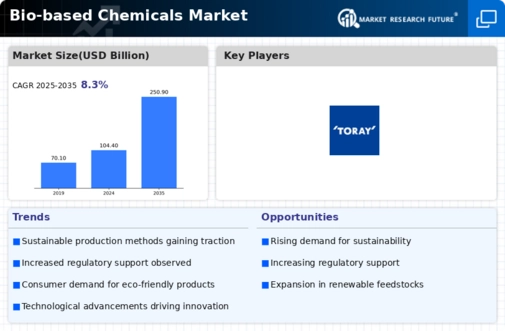-
EXECUTIVE SUMMARY 18
-
MARKET ATTRACTIVENESS ANALYSIS 20
- GLOBAL BIO-BASED CHEMICALS MARKET, BY TYPE 21
- GLOBAL BIO-BASED CHEMICALS MARKET, BY APPLICATION 22
- GLOBAL BIO-BASED CHEMICALS MARKET, BY REGION 23
-
MARKET INTRODUCTION 24
-
DEFINITION 24
-
SCOPE OF THE STUDY 24
-
MARKET STRUCTURE 25
-
RESEARCH METHODOLOGY 26
-
RESEARCH PROCESS 26
-
PRIMARY RESEARCH 27
-
SECONDARY RESEARCH 28
-
MARKET SIZE ESTIMATION 28
-
TOP-DOWN AND BOTTOM-UP APPROACH 29
-
FORECAST MODEL 30
-
LIST OF ASSUMPTIONS & LIMITATIONS 31
-
MARKET DYNAMICS 32
-
INTRODUCTION 32
-
DRIVERS 33
- GROWING DEMAND FOR BIO-BASED LUBRICANTS 33
- INCREASING ADOPTION OF BIOPLASTICS 33
- INCREASING APPLICATION OF BIO-BASED ALCOHOLS 34
-
RESTRAINTS 36
- VOLATILE RAW MATERIAL PRICES 36
- DISADVANTAGES RELATED TO BIO-BASED LUBRICANTS AND BIOPLASTICS 37
-
OPPORTUNITIES 38
- INCREASING NUMBER OF LIGNOCELLULOSIC BIOREFINERIES 38
- RESEARCH & DEVELOPMENT RELATED TO BIO-BASED CHEMICALS 38
-
TREND 39
- INCREASING FOCUS ON PRODUCTION COST OPTIMIZATION THROUGH TECHNOLOGICAL INNOVATION 39
-
MACROECONOMIC INDICATORS 40
- GDP GROWTH 40
-
MARKET FACTOR ANALYSIS 42
-
SUPPLY CHAIN ANALYSIS 42
- RAW MATERIAL SUPPLIERS 42
- BIO-BASED CHEMICALS PRODUCERS 46
- DISTRIBUTION & SALES CHANNEL 46
- APPLICATION 47
-
PORTER''S FIVE FORCES ANALYSIS 48
- THREAT OF NEW ENTRANTS 48
- BARGAINING POWER OF SUPPLIERS 49
- THREAT OF SUBSTITUTES 49
- BARGAINING POWER OF BUYERS 49
- INTENSITY OF RIVALRY 49
-
PRICING OVERVIEW, 2019-2021 (USD/TONS) 49
- PRICING OVERVIEW, BY REGION 49
- PRICING OVERVIEW, BY COUNTRY 50
- PRICING OVERVIEW, BY TYPE 50
-
REGULATORY FRAMEWORK 50
-
GLOBAL PETROCHEMICALS MARKET OUTLOOK 54
- COMPARISON ANALYSIS ON BIO-BASED CHEMICALS & PETROCHEMICALS 56
-
IMPACT OF COVID 19 OUTBREAK ON GLOBAL BIO-BASED CHEMICALS MARKET 56
- IMPACT ON GLOBAL ECONOMY 56
- PRODUCTION SCENARIO 56
-
GLOBAL BIO-BASED CHEMICALS MARKET, BY TYPE 58
-
INTRODUCTION 58
-
BIO-PLASTICS 60
-
BIO-LUBRICANTS 62
-
BIO-SOLVENTS 63
-
BIO-SURFACTANTS 64
-
BIO-BASED ACIDS 65
-
BIO-ALCOHOLS 66
-
OTHERS 67
-
GLOBAL BIO-BASED CHEMICALS MARKET, BY APPLICATION 68
-
INTRODUCTION 68
-
AGRICULTURE 71
-
AUTOMOTIVE 72
-
PERSONAL CARE 73
-
FOOD & BEVERAGES 74
-
PACKAGING 75
-
DETERGENTS & CLEANERS 76
-
PAINTS & COATING 77
-
ADHESIVES & SEALANTS 78
-
PHARMACEUTICALS 79
-
PAINT DISPERSIONS 80
-
OTHERS 81
-
GLOBAL BIO-BASED CHEMICALS MARKET, BY REGION 83
-
INTRODUCTION 83
-
NORTH AMERICA 86
- US 89
- CANADA 91
-
EUROPE 94
- GERMANY 97
- UK 99
- RUSSIA 102
- FRANCE 104
- SPAIN 107
- ITALY 109
- REST OF EUROPE 112
-
ASIA-PACIFIC 115
- CHINA 119
- INDIA 121
- JAPAN 124
- AUSTRALIA & NEW ZEALAND 126
- SOUTH KOREA 129
- REST OF ASIA-PACIFIC 131
-
LATIN AMERICA 134
- BRAZIL 137
- MEXICO 140
- ARGENTINA 142
- REST OF LATIN AMERICA 145
-
MIDDLE EAST & AFRICA 148
- GCC COUNTRIES 151
- ISRAEL 154
- SOUTH AFRICA 156
- REST OF THE MIDDLE EAST & AFRICA 159
-
COMPETITIVE LANDSCAPE 162
-
INTRODUCTION 162
-
MARKET STRATEGY ANALYSIS 162
-
KEY DEVELOPMENTS & GROWTH STRATEGIES 163
-
COMPETITIVE BENCHMARKING 166
-
COMPANY PROFILES 167
-
BASF SE 167
- COMPANY OVERVIEW 167
- FINANCIAL OVERVIEW 168
- PRODUCTS OFFERED 168
- KEY DEVELOPMENTS 170
- SWOT ANALYSIS 170
- KEY STRATEGIES 171
-
DUPONT 172
- COMPANY OVERVIEW 172
- FINANCIAL OVERVIEW 172
- PRODUCTS OFFERED 173
- KEY DEVELOPMENTS 173
- SWOT ANALYSIS 174
- KEY STRATEGIES 174
-
VERTEC BIOSOLVENT 175
- COMPANY OVERVIEW 175
- FINANCIAL OVERVIEW 175
- PRODUCTS OFFERED 175
- KEY DEVELOPMENTS 176
- SWOT ANALYSIS 176
- KEY STRATEGIES 176
-
AGAE TECHNOLOGIES, LLC 177
- COMPANY OVERVIEW 177
- FINANCIAL OVERVIEW 177
- PRODUCTS OFFERED 177
- KEY DEVELOPMENT 177
- SWOT ANALYSIS 178
- KEY STRATEGIES 178
-
TOTALENERGIES 179
- COMPANY OVERVIEW 179
- FINANCIAL OVERVIEW 179
- PRODUCTS OFFERED 180
- KEY DEVELOPMENTS 180
- SWOT ANALYSIS 181
- KEY STRATEGIES 181
-
ARCHER DANIELS MIDLAND COMPANY 182
- COMPANY OVERVIEW 182
- FINANCIAL OVERVIEW 182
- PRODUCTS OFFERED 183
- KEY DEVELOPMENTS 183
- SWOT ANALYSIS 184
- KEY STRATEGIES 184
-
BRASKEM 185
- COMPANY OVERVIEW 185
- FINANCIAL OVERVIEW 185
- PRODUCTS OFFERED 186
- KEY DEVELOPMENTS 186
- SWOT ANALYSIS 187
- KEY STRATEGIES 187
-
EVONIK INDUSTRIES AG 188
- COMPANY OVERVIEW 188
- FINANCIAL OVERVIEW 189
- PRODUCTS OFFERED 189
- KEY DEVELOPMENTS 190
- SWOT ANALYSIS 191
- KEY STRATEGIES 191
-
TORAY INDUSTRIES INC 192
- COMPANY OVERVIEW 192
- FINANCIAL OVERVIEW 192
- PRODUCTS OFFERED 193
- KEY DEVELOPMENTS 193
- SWOT ANALYSIS 194
- KEY STRATEGIES 194
-
MITSUBISHI CHEMICAL CORPORATION 195
- COMPANY OVERVIEW 195
- FINANCIAL OVERVIEW 195
- PRODUCTS OFFERED 196
- KEY DEVELOPMENTS 196
- SWOT ANALYSIS 197
- KEY STRATEGIES 197
-
CARGILL, INCORPORATED 198
- COMPANY OVERVIEW 198
- FINANCIAL OVERVIEW 198
- PRODUCTS OFFERED 199
- KEY DEVELOPMENTS 200
- SWOT ANALYSIS 201
- KEY STRATEGIES 201
-
DSM 202
- COMPANY OVERVIEW 202
- FINANCIAL OVERVIEW 202
- PRODUCTS OFFERED 203
- KEY DEVELOPMENTS 203
- SWOT ANALYSIS 204
- KEY STRATEGIES 204
-
ITACONIX PLC 205
- COMPANY OVERVIEW 205
- FINANCIAL OVERVIEW 205
- PRODUCTS OFFERED 206
- KEY DEVELOPMENTS 206
- SWOT ANALYSIS 206
- KEY STRATEGIES 207
-
LYONDELLBASELL 208
- COMPANY OVERVIEW 208
- FINANCIAL OVERVIEW 208
- PRODUCTS OFFERED 209
- KEY DEVELOPMENT 209
- SWOT ANALYSIS 210
- KEY STRATEGIES 210
-
GFBIOCHEMICALS LTD 211
- COMPANY OVERVIEW 211
- FINANCIAL OVERVIEW 211
- PRODUCTS OFFERED 211
- KEY DEVELOPMENTS 211
- SWOT ANALYSIS 212
- KEY STRATEGIES 212
-
APPENDIX 213
-
REFERENCES 213
-
RELATED REPORTS 214
-
-
LIST OF TABLES
-
LIST OF ASSUMPTIONS & LIMITATIONS 31
-
GLOBAL NOMINAL GDP AND GDP GROWTH RATE, 2019 40
-
LIST OF RAW MATEIAL SUPPLIERS 43
-
LIST OF TOP 10 COUNTRIES PRODUCING CORN, 2019 (MILLION TONNES) 43
-
LIST OF TOP 10 COUNTRIES PRODUCING SUGARCANE, 2019 (MILLION TONNES) 44
-
LIST OF TOP 10 COUNTRIES PRODUCING SUGAR BEET, 2019 (MILLION TONNES) 44
-
LIST OF TOP 10 COUNTRIES PRODUCING WHEAT, 2019 (MILLION TONNES) 45
-
LIST OF TOP 10 COUNTRIES PRODUCING CEREALS, 2019 (MILLION TONNES) 45
-
RAW MATERIAL PRICING ANALYSIS (USD/TONS) 46
-
LIST OF DISTRIBUTORS 47
-
PRICING OVERVIEW, BY REGION 49
-
PRICING OVERVIEW, BY COUNTRY 50
-
PRICING OVERVIEW, BY TYPE 50
-
LIST OF REGULATIONS ON SYNTHETIC CHEMICALS 51
-
LEGISLATIONS RELATED TO BIO-BASED CHEMICALS 53
-
GLOBAL BIO-BASED CHEMICALS, BY TYPE, 2022-2030 (USD MILLION) 59
-
GLOBAL BIO-BASED CHEMICALS MARKET, BY TYPE, 2022-2030 (KILOTONS) 60
-
GLOBAL BIO-BASED CHEMICALS MARKET FOR BIO-PLASTICS, BY REGION, 2022-2030 (USD MILLION) 61
-
GLOBAL BIO-BASED CHEMICALS MARKET FOR BIO-PLASTICS, BY REGION, 2022-2030 (KILOTONS) 61
-
GLOBAL BIO-BASED CHEMICALS MARKET FOR BIO-LUBRICANTS, BY REGION, 2022-2030 (USD MILLION) 62
-
GLOBAL BIO-BASED CHEMICALS MARKET FOR BIO-LUBRICANTS, BY REGION, 2022-2030 (KILOTONS) 62
-
GLOBAL BIO-BASED CHEMICALS MARKET FOR BIO-SOLVENTS, BY REGION, 2022-2030 (USD MILLION) 63
-
GLOBAL BIO-BASED CHEMICALS MARKET FOR BIO-SOLVENTS, BY REGION, 2022-2030 (KILOTONS) 63
-
GLOBAL BIO-BASED CHEMICALS MARKET FOR BIO-SURFACTANTS, BY REGION, 2022-2030 (USD MILLION) 64
-
GLOBAL BIO-BASED CHEMICALS MARKET FOR BIO-SURFACTANTS, BY REGION, 2022-2030 (KILOTONS) 64
-
GLOBAL BIO-BASED CHEMICALS MARKET FOR BIO-BASED ACIDS, BY REGION, 2022-2030 (USD MILLION) 65
-
GLOBAL BIO-BASED CHEMICALS MARKET FOR BIO-BASED ACIDS, BY REGION, 2022-2030 (KILOTONS) 65
-
GLOBAL BIO-BASED CHEMICALS MARKET FOR BIO-ALCOHOLS, BY REGION, 2022-2030 (USD MILLION) 66
-
GLOBAL BIO-BASED CHEMICALS MARKET FOR BIO-ALCOHOLS, BY REGION, 2022-2030 (KILOTONS) 66
-
GLOBAL BIO-BASED CHEMICALS MARKET FOR OTHERS, BY REGION, 2022-2030 (USD MILLION) 67
-
GLOBAL BIO-BASED CHEMICALS MARKET FOR OTHERS, BY REGION, 2022-2030 (KILOTONS) 67
-
GLOBAL BIO-BASED CHEMICALS, BY APPLICATION, 2022-2030 (USD MILLION) 69
-
GLOBAL BIO-BASED CHEMICALS MARKET, BY APPLICATION, 2022-2030 (KILOTONS) 70
-
GLOBAL BIO-BASED CHEMICALS MARKET FOR AGRICULTURE, BY REGION, 2022-2030 (USD MILLION) 71
-
GLOBAL BIO-BASED CHEMICALS MARKET FOR AGRICULTURE, BY REGION, 2022-2030 (KILOTONS) 72
-
GLOBAL BIO-BASED CHEMICALS MARKET FOR AUTOMOTIVE, BY REGION, 2022-2030 (USD MILLION) 72
-
GLOBAL BIO-BASED CHEMICALS MARKET FOR AUTOMOTIVE, BY REGION, 2022-2030 (KILOTONS) 73
-
GLOBAL BIO-BASED CHEMICALS MARKET FOR PERSONAL CARE, BY REGION, 2022-2030 (USD MILLION) 73
-
GLOBAL BIO-BASED CHEMICALS MARKET FOR PERSONAL CARE, BY REGION, 2022-2030 (KILOTONS) 74
-
GLOBAL BIO-BASED CHEMICALS MARKET FOR FOOD & BEVERAGES, BY REGION, 2022-2030 (USD MILLION) 74
-
GLOBAL BIO-BASED CHEMICALS MARKET FOR FOOD & BEVERAGES, BY REGION, 2022-2030 (KILOTONS) 75
-
GLOBAL BIO-BASED CHEMICALS MARKET FOR PACKAGING, BY REGION, 2022-2030 (USD MILLION) 75
-
GLOBAL BIO-BASED CHEMICALS MARKET FOR PACKAGING, BY REGION, 2022-2030 (KILOTONS) 76
-
GLOBAL BIO-BASED CHEMICALS MARKET FOR DETERGENTS & CLEANERS, BY REGION, 2022-2030 (USD MILLION) 76
-
GLOBAL BIO-BASED CHEMICALS MARKET FOR DETERGENTS & CLEANERS, BY REGION, 2022-2030 (KILOTONS) 77
-
GLOBAL BIO-BASED CHEMICALS MARKET FOR PAINTS & COATING, BY REGION, 2022-2030 (USD MILLION) 77
-
GLOBAL BIO-BASED CHEMICALS MARKET FOR PAINTS & COATING, BY REGION, 2022-2030 (KILOTONS) 78
-
GLOBAL BIO-BASED CHEMICALS MARKET FOR ADHESIVES & SEALANTS, BY REGION, 2022-2030 (USD MILLION) 78
-
GLOBAL BIO-BASED CHEMICALS MARKET FOR ADHESIVES & SEALANTS, BY REGION, 2022-2030 (KILOTONS) 79
-
GLOBAL BIO-BASED CHEMICALS MARKET FOR PHARMACEUTICALS, BY REGION, 2022-2030 (USD MILLION) 79
-
GLOBAL BIO-BASED CHEMICALS MARKET FOR PHARMACEUTICALS, BY REGION, 2022-2030 (KILOTONS) 80
-
GLOBAL BIO-BASED CHEMICALS MARKET FOR PAINT DISPERSIONS, BY REGION, 2022-2030 (USD MILLION) 80
-
GLOBAL BIO-BASED CHEMICALS MARKET FOR PAINT DISPERSIONS, BY REGION, 2022-2030 (KILOTONS) 81
-
GLOBAL BIO-BASED CHEMICALS MARKET FOR OTHERS, BY REGION, 2022-2030 (USD MILLION) 81
-
GLOBAL BIO-BASED CHEMICALS MARKET FOR OTHERS, BY REGION, 2022-2030 (KILOTONS) 82
-
GLOBAL BIO-BASED CHEMICALS MARKET, BY REGION, 2022-2030 (USD MILLION) 84
-
GLOBAL BIO-BASED CHEMICALS MARKET, BY REGION, 2022-2030 (KILOTONS) 85
-
NORTH AMERICA BIO-BASED CHEMICALS MARKET, BY COUNTRY, 2022-2030 (USD MILLION) 86
-
NORTH AMERICA BIO-BASED CHEMICALS MARKET, BY COUNTRY, 2022-2030 (KILOTONS) 86
-
NORTH AMERICA BIO-BASED CHEMICALS MARKET, BY TYPE, 2022-2030 (USD MILLION) 87
-
NORTH AMERICA BIO-BASED CHEMICALS MARKET, BY TYPE, 2022-2030 (KILOTONS) 87
-
NORTH AMERICA BIO-BASED CHEMICALS MARKET, BY APPLICATION, 2022-2030 (USD MILLION) 88
-
NORTH AMERICA BIO-BASED CHEMICALS MARKET, BY APPLICATION, 2022-2030 (KILOTONS) 88
-
US BIO-BASED CHEMICALS MARKET, BY TYPE, 2022-2030 (USD MILLION) 89
-
US BIO-BASED CHEMICALS MARKET, BY TYPE, 2022-2030 (KILOTONS) 89
-
US BIO-BASED CHEMICALS MARKET, BY APPLICATION, 2022-2030 (USD MILLION) 90
-
US BIO-BASED CHEMICALS MARKET, BY APPLICATION, 2022-2030 (KILOTONS) 90
-
CANADA BIO-BASED CHEMICALS MARKET, BY TYPE, 2022-2030 (USD MILLION) 91
-
CANADA BIO-BASED CHEMICALS MARKET, BY TYPE, 2022-2030 (KILOTONS) 91
-
CANADA BIO-BASED CHEMICALS MARKET, BY APPLICATION, 2022-2030 (USD MILLION) 92
-
CANADA BIO-BASED CHEMICALS MARKET, BY APPLICATION, 2022-2030 (KILOTONS) 93
-
EUROPE BIO-BASED CHEMICALS MARKET, BY COUNTRY, 2022-2030 (USD MILLION) 94
-
EUROPE BIO-BASED CHEMICALS MARKET, BY COUNTRY, 2022-2030 (KILOTONS) 95
-
EUROPE BIO-BASED CHEMICALS MARKET, BY TYPE, 2022-2030 (USD MILLION) 95
-
EUROPE BIO-BASED CHEMICALS MARKET, BY TYPE, 2022-2030 (KILOTONS) 96
-
EUROPE BIO-BASED CHEMICALS MARKET, BY APPLICATION, 2022-2030 (USD MILLION) 96
-
EUROPE BIO-BASED CHEMICALS MARKET, BY APPLICATION, 2022-2030 (KILOTONS) 97
-
GERMANY BIO-BASED CHEMICALS MARKET, BY TYPE, 2022-2030 (USD MILLION) 97
-
GERMANY BIO-BASED CHEMICALS MARKET, BY TYPE, 2022-2030 (KILOTONS) 98
-
GERMANY BIO-BASED CHEMICALS MARKET, BY APPLICATION, 2022-2030 (USD MILLION) 98
-
GERMANY BIO-BASED CHEMICALS MARKET, BY APPLICATION, 2022-2030 (KILOTONS) 99
-
UK BIO-BASED CHEMICALS MARKET, BY TYPE, 2022-2030 (USD MILLION) 99
-
UK BIO-BASED CHEMICALS MARKET, BY TYPE, 2022-2030 (KILOTONS) 100
-
UK BIO-BASED CHEMICALS MARKET, BY APPLICATION, 2022-2030 (USD MILLION) 100
-
UK BIO-BASED CHEMICALS MARKET, BY APPLICATION, 2022-2030 (KILOTONS) 101
-
RUSSIA BIO-BASED CHEMICALS MARKET, BY TYPE, 2022-2030 (USD MILLION) 102
-
RUSSIA BIO-BASED CHEMICALS MARKET, BY TYPE, 2022-2030 (KILOTONS) 102
-
RUSSIA BIO-BASED CHEMICALS MARKET, BY APPLICATION, 2022-2030 (USD MILLION) 103
-
RUSSIA BIO-BASED CHEMICALS MARKET, BY APPLICATION, 2022-2030 (KILOTONS) 104
-
FRANCE BIO-BASED CHEMICALS MARKET, BY TYPE, 2022-2030 (USD MILLION) 104
-
FRANCE BIO-BASED CHEMICALS MARKET, BY TYPE, 2022-2030 (KILOTONS) 105
-
FRANCE BIO-BASED CHEMICALS MARKET, BY APPLICATION, 2022-2030 (USD MILLION) 105
-
FRANCE BIO-BASED CHEMICALS MARKET, BY APPLICATION, 2022-2030 (KILOTONS) 106
-
SPAIN BIO-BASED CHEMICALS MARKET, BY TYPE, 2022-2030 (USD MILLION) 107
-
SPAIN BIO-BASED CHEMICALS MARKET, BY TYPE, 2022-2030 (KILOTONS) 107
-
SPAIN BIO-BASED CHEMICALS MARKET, BY APPLICATION, 2022-2030 (USD MILLION) 108
-
SPAIN BIO-BASED CHEMICALS MARKET, BY APPLICATION, 2022-2030 (KILOTONS) 109
-
ITALY BIO-BASED CHEMICALS MARKET, BY TYPE, 2022-2030 (USD MILLION) 109
-
ITALY BIO-BASED CHEMICALS MARKET, BY TYPE, 2022-2030 (KILOTONS) 110
-
ITALY BIO-BASED CHEMICALS MARKET, BY APPLICATION, 2022-2030 (USD MILLION) 110
-
ITALY BIO-BASED CHEMICALS MARKET, BY APPLICATION, 2022-2030 (KILOTONS) 111
-
REST OF EUROPE BIO-BASED CHEMICALS MARKET, BY TYPE, 2022-2030 (USD MILLION) 112
-
REST OF EUROPE BIO-BASED CHEMICALS MARKET, BY TYPE, 2022-2030 (KILOTONS) 112
-
REST OF EUROPE BIO-BASED CHEMICALS MARKET, BY APPLICATION, 2022-2030 (USD MILLION) 113
-
REST OF EUROPE BIO-BASED CHEMICALS MARKET, BY APPLICATION, 2022-2030 (KILOTONS) 114
-
ASIA-PACIFIC BIO-BASED CHEMICALS MARKET, BY COUNTRY, 2022-2030 (USD MILLION) 115
-
ASIA-PACIFIC BIO-BASED CHEMICALS MARKET, BY COUNTRY, 2022-2030 (KILOTONS) 116
-
ASIA-PACIFIC BIO-BASED CHEMICALS MARKET, BY TYPE, 2022-2030 (USD MILLION) 116
-
ASIA-PACIFIC BIO-BASED CHEMICALS MARKET, BY TYPE, 2022-2030 (KILOTONS) 117
-
ASIA-PACIFIC BIO-BASED CHEMICALS MARKET, BY APPLICATION, 2022-2030 (USD MILLION) 117
-
ASIA-PACIFIC BIO-BASED CHEMICALS MARKET, BY APPLICATION, 2022-2030 (KILOTONS) 118
-
CHINA BIO-BASED CHEMICALS MARKET, BY TYPE, 2022-2030 (USD MILLION) 119
-
CHINA BIO-BASED CHEMICALS MARKET, BY TYPE, 2022-2030 (KILOTONS) 119
-
CHINA BIO-BASED CHEMICALS MARKET, BY APPLICATION, 2022-2030 (USD MILLION) 120
-
CHINA BIO-BASED CHEMICALS MARKET, BY APPLICATION, 2022-2030 (KILOTONS) 121
-
INDIA BIO-BASED CHEMICALS MARKET, BY TYPE, 2022-2030 (USD MILLION) 121
-
INDIA BIO-BASED CHEMICALS MARKET, BY TYPE, 2022-2030 (KILOTONS) 122
-
INDIA BIO-BASED CHEMICALS MARKET, BY APPLICATION, 2022-2030 (USD MILLION) 122
-
INDIA BIO-BASED CHEMICALS MARKET, BY APPLICATION, 2022-2030 (KILOTONS) 123
-
JAPAN BIO-BASED CHEMICALS MARKET, BY TYPE, 2022-2030 (USD MILLION) 124
-
JAPAN BIO-BASED CHEMICALS MARKET, BY TYPE, 2022-2030 (KILOTONS) 124
-
JAPAN BIO-BASED CHEMICALS MARKET, BY APPLICATION, 2022-2030 (USD MILLION) 125
-
JAPAN BIO-BASED CHEMICALS MARKET, BY APPLICATION, 2022-2030 (KILOTONS) 126
-
AUSTRALIA & NEW ZEALAND BIO-BASED CHEMICALS MARKET, BY TYPE, 2022-2030 (USD MILLION) 126
-
AUSTRALIA & NEW ZEALAND BIO-BASED CHEMICALS MARKET, BY TYPE, 2022-2030 (KILOTONS) 127
-
AUSTRALIA & NEW ZEALAND BIO-BASED CHEMICALS MARKET, BY APPLICATION, 2022-2030 (USD MILLION) 127
-
AUSTRALIA & NEW ZEALAND BIO-BASED CHEMICALS MARKET, BY APPLICATION, 2022-2030 (KILOTONS) 128
-
SOUTH KOREA BIO-BASED CHEMICALS MARKET, BY TYPE, 2022-2030 (USD MILLION) 129
-
SOUTH KOREA BIO-BASED CHEMICALS MARKET, BY TYPE, 2022-2030 (KILOTONS) 129
-
SOUTH KOREA BIO-BASED CHEMICALS MARKET, BY APPLICATION, 2022-2030 (USD MILLION) 130
-
SOUTH KOREA BIO-BASED CHEMICALS MARKET, BY APPLICATION, 2022-2030 (KILOTONS) 131
-
REST OF ASIA-PACIFIC BIO-BASED CHEMICALS MARKET, BY TYPE, 2022-2030 (USD MILLION) 131
-
REST OF ASIA-PACIFIC BIO-BASED CHEMICALS MARKET, BY TYPE, 2022-2030 (KILOTONS) 132
-
REST OF ASIA-PACIFIC BIO-BASED CHEMICALS MARKET, BY APPLICATION, 2022-2030 (USD MILLION) 132
-
REST OF ASIA-PACIFIC BIO-BASED CHEMICALS MARKET, BY APPLICATION, 2022-2030 (KILOTONS) 133
-
LATIN AMERICA BIO-BASED CHEMICALS MARKET, BY COUNTRY, 2022-2030 (USD MILLION) 134
-
LATIN AMERICA BIO-BASED CHEMICALS MARKET, BY COUNTRY, 2022-2030 (KILOTONS) 134
-
LATIN AMERICA BIO-BASED CHEMICALS MARKET, BY TYPE, 2022-2030 (USD MILLION) 135
-
LATIN AMERICA BIO-BASED CHEMICALS MARKET, BY TYPE, 2022-2030 (KILOTONS) 135
-
LATIN AMERICA BIO-BASED CHEMICALS MARKET, BY APPLICATION, 2022-2030 (USD MILLION) 136
-
LATIN AMERICA BIO-BASED CHEMICALS MARKET, BY APPLICATION, 2022-2030 (KILOTONS) 137
-
BRAZIL BIO-BASED CHEMICALS MARKET, BY TYPE, 2022-2030 (USD MILLION) 137
-
BRAZIL BIO-BASED CHEMICALS MARKET, BY TYPE, 2022-2030 (KILOTONS) 138
-
BRAZIL BIO-BASED CHEMICALS MARKET, BY APPLICATION, 2022-2030 (USD MILLION) 138
-
BRAZIL BIO-BASED CHEMICALS MARKET, BY APPLICATION, 2022-2030 (KILOTONS) 139
-
MEXICO BIO-BASED CHEMICALS MARKET, BY TYPE, 2022-2030 (USD MILLION) 140
-
MEXICO BIO-BASED CHEMICALS MARKET, BY TYPE, 2022-2030 (KILOTONS) 140
-
MEXICO BIO-BASED CHEMICALS MARKET, BY APPLICATION, 2022-2030 (USD MILLION) 141
-
MEXICO BIO-BASED CHEMICALS MARKET, BY APPLICATION, 2022-2030 (KILOTONS) 142
-
ARGENTINA BIO-BASED CHEMICALS MARKET, BY TYPE, 2022-2030 (USD MILLION) 142
-
ARGENTINA BIO-BASED CHEMICALS MARKET, BY TYPE, 2022-2030 (KILOTONS) 143
-
ARGENTINA BIO-BASED CHEMICALS MARKET, BY APPLICATION, 2022-2030 (USD MILLION) 143
-
ARGENTINA BIO-BASED CHEMICALS MARKET, BY APPLICATION, 2022-2030 (KILOTONS) 144
-
REST OF LATIN AMERICA BIO-BASED CHEMICALS MARKET, BY TYPE, 2022-2030 (USD MILLION) 145
-
REST OF LATIN AMERICA BIO-BASED CHEMICALS MARKET, BY TYPE, 2022-2030 (KILOTONS) 145
-
REST OF LATIN AMERICA BIO-BASED CHEMICALS MARKET, BY APPLICATION, 2022-2030 (USD MILLION) 146
-
REST OF LATIN AMERICA BIO-BASED CHEMICALS MARKET, BY APPLICATION, 2022-2030 (KILOTONS) 147
-
MIDDLE EAST & AFRICA BIO-BASED CHEMICALS MARKET, BY COUNTRY, 2022-2030 (USD MILLION) 148
-
MIDDLE EAST & AFRICA BIO-BASED CHEMICALS MARKET, BY COUNTRY, 2022-2030 (KILOTONS) 149
-
MIDDLE EAST & AFRICA BIO-BASED CHEMICALS MARKET, BY TYPE, 2022-2030 (USD MILLION) 149
-
MIDDLE EAST & AFRICA BIO-BASED CHEMICALS MARKET, BY TYPE, 2022-2030 (KILOTONS) 150
-
MIDDLE EAST & AFRICA BIO-BASED CHEMICALS MARKET, BY APPLICATION, 2022-2030 (USD MILLION) 150
-
MIDDLE EAST & AFRICA BIO-BASED CHEMICALS MARKET, BY APPLICATION, 2022-2030 (KILOTONS) 151
-
GCC COUNTRIES BIO-BASED CHEMICALS MARKET, BY TYPE, 2022-2030 (USD MILLION) 151
-
GCC COUNTRIES BIO-BASED CHEMICALS MARKET, BY TYPE, 2022-2030 (KILOTONS) 152
-
GCC COUNTRIES BIO-BASED CHEMICALS MARKET, BY APPLICATION, 2022-2030 (USD MILLION) 152
-
GCC COUNTRIES BIO-BASED CHEMICALS MARKET, BY APPLICATION, 2022-2030 (KILOTONS) 153
-
ISRAEL BIO-BASED CHEMICALS MARKET, BY TYPE, 2022-2030 (USD MILLION) 154
-
ISRAEL BIO-BASED CHEMICALS MARKET, BY TYPE, 2022-2030 (KILOTONS) 154
-
ISRAEL BIO-BASED CHEMICALS MARKET, BY APPLICATION, 2022-2030 (USD MILLION) 155
-
ISRAEL BIO-BASED CHEMICALS MARKET, BY APPLICATION, 2022-2030 (KILOTONS) 156
-
SOUTH AFRICA BIO-BASED CHEMICALS MARKET, BY TYPE, 2022-2030 (USD MILLION) 156
-
SOUTH AFRICA BIO-BASED CHEMICALS MARKET, BY TYPE, 2022-2030 (KILOTONS) 157
-
SOUTH AFRICA BIO-BASED CHEMICALS MARKET, BY APPLICATION, 2022-2030 (USD MILLION) 157
-
SOUTH AFRICA BIO-BASED CHEMICALS MARKET, BY APPLICATION, 2022-2030 (KILOTONS) 158
-
REST OF THE MIDDLE EAST & AFRICA BIO-BASED CHEMICALS MARKET, BY TYPE, 2022-2030 (USD MILLION) 159
-
REST OF THE MIDDLE EAST & AFRICA BIO-BASED CHEMICALS MARKET, BY TYPE, 2022-2030 (KILOTONS) 159
-
REST OF THE MIDDLE EAST & AFRICA BIO-BASED CHEMICALS MARKET, BY APPLICATION, 2022-2030 (USD MILLION) 160
-
REST OF THE MIDDLE EAST & AFRICA BIO-BASED CHEMICALS MARKET, BY APPLICATION, 2022-2030 (KILOTONS) 161
-
KEY DEVELOPMENTS & GROWTH STRATEGIES 163
-
BASF SE: PRODUCTS OFFERED 168
-
BASF SE: KEY DEVELOPMENTS 170
-
DUPONT: PRODUCTS OFFERED 173
-
DUPONT: KEY DEVELOPMENTS 173
-
VERTEC BIOSOLVENTS: PRODUCTS OFFERED 175
-
AGAE TECHNOLOGIES, LLC: PRODUCTS OFFERED 177
-
TOTALENERGIES: PRODUCTS OFFERED 180
-
TOTALENERGIES: KEY DEVELOPMENTS 180
-
ARCHER DANIELS MIDLAND COMPANY: PRODUCTS OFFERED 183
-
ARCHER DANIELS MIDLAND COMPANY: KEY DEVELOPMENTS 183
-
BRASKEM: PRODUCTS OFFERED 186
-
EVONIK INDUSTRIES AG.: PRODUCTS OFFERED 189
-
TORAY INDUSTRIES INC: PRODUCTS OFFERED 193
-
TORAY INDUSTRIES INC: KEY DEVELOPMENTS 193
-
MITSUBISHI CHEMICAL CORPORATION: PRODUCTS OFFERED 196
-
MITSUBISHI CHEMICAL CORPORATION: KEY DEVELOPMENTS 196
-
CARGILL, INCORPORATED: PRODUCTS OFFERED 199
-
CARGILL, INCORPORATED: KEY DEVELOPMENTS 200
-
DSM: PRODUCTS OFFERED 203
-
DSM: KEY DEVELOPMENTS 203
-
ITACONIX PLC: PRODUCTS OFFERED 206
-
LYONDELLBASELL: PRODUCTS OFFERED 209
-
GFBIOCHEMICALS LTD: PRODUCTS OFFERED 211
-
-
LIST OF FIGURES
-
MARKET SYNOPSIS 19
-
MARKET ATTRACTIVENESS ANALYSIS: GLOBAL BIO-BASED CHEMICALS MARKET, 2020 20
-
GLOBAL BIO-BASED CHEMICALS MARKET ANALYSIS BY TYPE 21
-
GLOBAL BIO-BASED CHEMICALS MARKET ANALYSIS BY APPLICATION 22
-
GLOBAL BIO-BASED CHEMICALS MARKET ANALYSIS BY REGION 23
-
GLOBAL BIO-BASED CHEMICALS MARKET: MARKET STRUCTURE 25
-
RESEARCH PROCESS OF MRFR 26
-
MARKET DYNAMICS OVERVIEW 32
-
GLOBAL BIOPLASTICS PRODUCTION CAPACITIES, 2018 34
-
TRANSPORTATION BIOFUELS, 2019 35
-
GROWTH OF BIOFUEL ANNUAL PRODUCTION (%) (ACTUAL VS REQUIRED) 35
-
DRIVERS IMPACT ANALYSIS 36
-
RESTRAINTS IMPACT ANALYSIS 38
-
UPPLY CHAIN ANALYSIS FOR GLOBAL BIO-BASED CHEMICALS MARKET 42
-
PORTER''S FIVE FORCES ANALYSIS OF THE GLOBAL BIO-BASED CHEMICALS MARKET 48
-
CRUDE OIL PRICE FLUCTUATIONS, WTI 55
-
GLOBAL BIO-BASED CHEMICALS MARKET, BY TYPE, 2022-2030 (USD MILLION) 58
-
GLOBAL BIO-BASED CHEMICALS MARKET, BY TYPE, 2022-2030 (KILOTONS) 59
-
GLOBAL BIO-BASED CHEMICALS MARKET, BY APPLICATION, 2022-2030 (USD MILLION) 68
-
GLOBAL BIO-BASED CHEMICALS MARKET, BY APPLICATION, 2022-2030 (KILOTONS) 70
-
GLOBAL BIO-BASED CHEMICALS MARKET BY REGION, 2022-2030 (USD MILLION) 84
-
GLOBAL BIO-BASED CHEMICALS MARKET BY REGION, 2022-2030 (KILOTONS) 85
-
NORTH AMERICA BIO-BASED CHEMICALS MARKET, BY COUNTRY, 2020 (%SHARE) 86
-
EUROPE BIO-BASED CHEMICALS MARKET, BY COUNTRY, 2020 (%SHARE) 94
-
ASIA-PACIFIC BIO-BASED CHEMICALS MARKET, BY COUNTRY, 2020 (%SHARE) 115
-
LATIN AMERICA BIO-BASED CHEMICALS MARKET, BY COUNTRY, 2020 (%SHARE) 134
-
MIDDLE EAST & AFRICA BIO-BASED CHEMICALS MARKET, BY COUNTRY, 2020 (%SHARE) 148
-
MARKET STRATEGY ANALYSIS 162
-
COMPETITIVE BENCHMARKING 166
-
BASF SE: FINANCIAL OVERVIEW SNAPSHOT 168
-
BASF SE: SWOT ANALYSIS 170
-
DUPONT: FINANCIAL OVERVIEW SNAPSHOT 172
-
DUPONT: SWOT ANALYSIS 174
-
VERTEC BIOSOLVENTS: SWOT ANALYSIS 176
-
AGAE TECHNOLOGIES, LLC: SWOT ANALYSIS 178
-
TOTALENERGIES: FINANCIAL OVERVIEW SNAPSHOT 179
-
TOTALENERGIES: SWOT ANALYSIS 181
-
ARCHER DANIELS MIDLAND COMPANY: FINANCIAL OVERVIEW SNAPSHOT 182
-
ARCHER DANIELS MIDLAND COMPANY: SWOT ANALYSIS 184
-
BRASKEM: FINANCIAL OVERVIEW SNAPSHOT 185
-
BRASKEM: SWOT ANALYSIS 187
-
EVONIK INDUSTRIES AG: FINANCIAL OVERVIEW 189
-
EVONIK INDUSTRIES AG: SWOT ANALYSIS 191
-
TORAY INDUSTRIES INC: FINANCIAL OVERVIEW SNAPSHOT 192
-
TORAY INDUSTRIES INC: SWOT ANALYSIS 194
-
MITSUBISHI CHEMICAL CORPORATION: FINANCIAL OVERVIEW SNAPSHOT 195
-
MITSUBISHI CHEMICAL CORPORATION: SWOT ANALYSIS 197
-
CARGILL, INCORPORATED: FINANCIAL OVERVIEW SNAPSHOT 198
-
CARGILL, INCORPORATED.: SWOT ANALYSIS 201
-
DSM: FINANCIAL OVERVIEW SNAPSHOT 202
-
DSM: SWOT ANALYSIS 204
-
ITACONIX PLC: FINANCIAL OVERVIEW SNAPSHOT 205
-
ITACONIX PLC: SWOT ANALYSIS 206
-
LYONDELLBASELL: FINANCIAL OVERVIEW SNAPSHOT 208
-
LYONDELLBASELL: SWOT ANALYSIS 210
-
GFBIOCHEMICALS LTD: SWOT ANALYSIS 212


















Leave a Comment